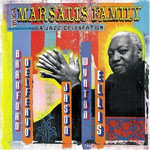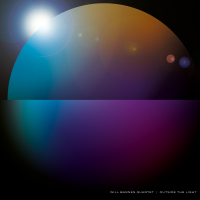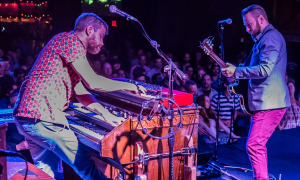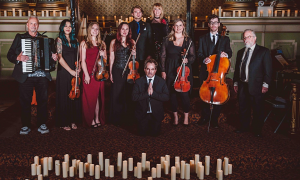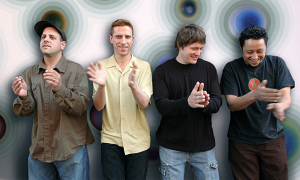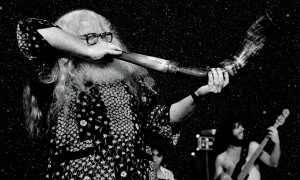Home » Jazz Articles » From the Inside Out » Thoughts of Chico Hamilton: Hollywood Swinging
Thoughts of Chico Hamilton: Hollywood Swinging
I go for the originals, people who invent and create a sound or create an emotion. 'Cause all we're dealing in is human emotion. That's all music is.
—Chico Hamilton
 He’s into his sixth decade of performing and recording, reaching way back to when he kept time for Lester Young and for Count Basie. But with his latest release, Thoughts of..., drummer Chico Hamilton demonstrates that he is not quite ready to drift into the mute pages of jazz history books just yet.
He’s into his sixth decade of performing and recording, reaching way back to when he kept time for Lester Young and for Count Basie. But with his latest release, Thoughts of..., drummer Chico Hamilton demonstrates that he is not quite ready to drift into the mute pages of jazz history books just yet. The 81-year old Hamilton has seen and done pretty much everything a musician can do. He played in a high school band near Los Angeles with such greats as Charles Mingus and Dexter Gordon, served in WWII, then returned to California, where he wound up furnishing the rhythmic linchpin for the famous Chet Baker / Gerry Mulligan “piano-less” quartets and quintets. After Mulligan got busted for drugs and the band broke up, Hamilton remained a pillar of West Coast jazz by forming his own influential, uniquely-instrumented quintet with Buddy Collete on reeds, Carson Smith on bass, Fred Katz on cello, and a young Jim Hall on guitar (again, sans piano). Like Art Blakey, Hamilton’s subsequent, frequent bands were schools that nurtured many significant modern players, including Hall, Charles Lloyd, Eric Dolphy, and Larry Coryell.
Consider Hamilton’s band Euphoria, which supports him on Thoughts of... and his previous release, Foreststorn : Paul Ramsey (bass), Cary DeNigris (guitar), whose playing also graces recent output from drummer Ronald Shannon Jackson, Erik Lawrence (alto and soprano saxophones), and Evan Schwan (tenor saxophone), although veteran players, are all still only around HALF his age, yet these Euphoria albums are driven by Hamilton’s colorful splashes and swinging, energetic pulses.

John Popper, harmonica player and frontman for Blues Traveler, and Spin Doctors guitarist Eric Schenkman, both former students of Hamilton’s at the New School of Music in New York City, honor their teacher on Foreststorn by respectively rocking out on the blues “I’m Gonna Move to the Outskirts of Town” and “Guitar Willie.” Rolling Stones drummer Charlie Watts, a longtime Hamilton admirer who once fancied himself as “Chico Watts,” guests on “Here Comes Charlie Now,” while former band member Arthur Blythe returns his saxophone to the Hamilton fold on “11 Bars for Arthur.”

Chico’s pretty hip with the younger crowd, too: “For Mods Only,” a track from Hamilton’s 1968 album The Dealer, was not only included on The Thievery Corporation’s trippy Sounds from the Verve Hi-Fi compilation, but, according to the Corporation’s Eric Hilton, “In fact, we were going to name the compilation ‘For Mods Only.’ Maybe next time.” Speaking of “mods,” Thoughts of... ends with Hamilton’s house-rocking romp through “Bull-Rush,” composed by Paul Weller, leader of mod revivalists the Jam from the days when punk rockers roamed the British earth.
However, Thoughts of... does allow Hamilton some reflection on his six-decade career through tributes to – his own “thoughts of” – three of the most influential horn players in modern jazz: “Thoughts of Trane” for John Coltrane, “Thoughts of Pres” for Lester Young, and a cover of “Freddie Freeloader” for Miles Davis. Joe Beck, Larry Coryell, and Rodney Jones, all alumni of earlier Hamilton bands, play guitar guest spots on the soulful, joyously blue “Mother Tucker” (Beck), “Could Be” (Jones) and “Rusty Dusty Blues (Mama Mama Blues)” (a surgically incisive Coryell).
But Thoughts of... is not entirely a look back: "Je Ka Jo" is DeNigris' arrangement of the tune written by modern remix master Joaquin “Joe” Claussell, who has also helped mastermind an entire set of extended Hamilton remixes and dubs, Groove Master Vol. 1: Soulfeast Presents the Chico Hamilton Remix Project, as the first 2003 release of the new Soulfeast label.
Late one subfreezing January afternoon, tucked in the pocket of his New York apartment overlooking the UN, Hamilton reflected on his past, present, and future with AAJ.
AllAboutJazz: What do you miss the most from the jazz scene in Los Angeles during the 1950s?
Chico Hamilton: (Laughs) That’s a good question. I really don’t miss anything! First of all, I’ve been blessed. From the very get-go, when I first started making a living playing when I was about twelve or thirteen years old, making 75 cents a night – like, three quarters, with the hat, you know – I’ve always been musically in dynamite company. My formative years, I was playing shows when I was fifteen, sixteen years old, I could play the hell out of a show for dancers and singers and all of that jazz.
AAJ: Is there a unique relationship between drumming and dancing?
CH: Very much so. When the drummers used to use brushes, most drummers, what we tried to do, we tried to imitate tap dancers. Play all the licks that tap dancers would lay down.
AAJ: Are drummers good dancers?
CH: The majority of them. The ones I knew were.
AAJ: How about you?
CH: Oh, I dance my keister off, man. I used to try to tap, you know. Jo Jones...virtually all drummers danced at one time or another during their career.
AAJ: Do you have a favorite James Brown song?
CH: I’m not too familiar with James Brown, strangely enough. That wasn’t my schtick, you know? I was strictly into jazz. I played for people like Cole & Atkins, I played for Pete Nugent, I played for the Berry brothers, people like that – these are tap dancers, man. James Brown wasn’t a tap dancer. I played for hoofers, I kept time for the hoofers.
AAJ: How did playing without a pianist, first with the famous Mulligan / Baker bands and then with your own ensembles, change the way that you as a drummer interact with the bassist?
CH: One of the reasons why I didn’t have the piano is that the piano players that I wanted all had their own groups going, for one thing, so I turned to guitar. So I learned by using the guitar, I began to appreciate the sustaining power of the guitar more so than the sharpness of the piano. Subsequently, I began to play like a pianist keeping time in my band as opposed to having a piano. If you notice, all my records, we ride, there’s a riding feeling, you know what I mean? A looseness. It does make a difference, not having a piano. Also, a pianist will make an instrumentalist lock in to him; a pianist hits a certain chord in a certain way, you have no choice in the matter but you got to go with it.
AAJ: And a guitarist does not?
CH: With the guitar being able to sustain, there’s more freedom there. There’s more space for the soloist to express himself.
AAJ: What was the most famous commercial that featured your music?
CH: When IBM first went on the air, I did all of those. Three minutes spots about food, clothing, and shelter. Being three minutes was like doing a feature at that time, as opposed to fifteen seconds and sixty seconds. I did Revlon, I did Chrysler, you name it.
AAJ: Have you ever worked with Freddie Cole? Your blues vocal on “Rusty Dusty Blues” sure sounds like it.
CH: No, I never played with Freddie. But I sang when I was in this band we had when I was in high school, and I’ll tell you the members of the band: Dexter Gordon, Illinois Jacquet, Jack Kelso, Buddy Collette, and Mingus...that was our high school band, right? I used to sing. I used to imitate Jimmy Griffin, from Jimmy Lunceford’s band. I used to imitate Nat from time to time, you know.
 AAJ: How did you end up recording with Tony Bennett? (“Crazy Rhythm” from Tony Bennett: Jazz, recorded June 1957)
AAJ: How did you end up recording with Tony Bennett? (“Crazy Rhythm” from Tony Bennett: Jazz, recorded June 1957)
CH: It was on a break when I was with Lena Horne. We were off for about six months, something like that. It was during the period when I was with Lena. But Tony and I, we dug each other, we still dig each other.

AAJ: Three tracks on Thoughts of... portray your musical tributes to Miles Davis, Lester Young, and John Coltrane. We’d like to give you the opportunity to do in words what you did with music: When you close your eyes and think about him, what are your thoughts of Miles Davis?
CH: Miles was...we were friends, man, we were good friends. We weren’t on the phone every day or that type of thing, but I had a tremendous amount of respect for him and he had a tremendous amount of respect for me. We dug each other, you know? As a matter of fact, when I first came to New York, he was one of the first guys that I met. Max Roach introduced me to Miles, when Miles was playing on 52nd street. This was in 1946. To me, Miles wasn’t a trumpet player, man. I consider Miles...Miles was a sound. You understand that? He was a sound, man, a once in a lifetime kind of sound that comes your way.
The same way that I felt about “Pres.” Pres was my idol. Never did I ever think that I would play with him, keep time for him, which I did. He had been in the scene longer. You’ve got to understand something: At that time, all the musicians and entertainers during the 1940s, ‘50s, ‘60s, like that, we all started out young. I mean, really young...maybe today it’s a different thing because it’s a showbiz kind of a thing now, it’s a different kind of a thing altogether.
I find that mediocrity is king. Two thirds of the people that make all the money don’t have any talent, that kind of thing. It’s everything, in all the crafts. Unfortunately, the young people don’t know what good is. It’s not that...I dig young people, that’s why I teach, you dig? That’s my reward. I teach two credited courses toward a BA at the New School of Music. One is called Analysis of Rhythm and the other one is Ensemble Improvisation. Because music has been very good to me and in teaching hopefully I can help a young person to develop into a better musician, a better human being and person.
AAJ: We did not talk about Coltrane.
CH: We did not talk about Trane. John and Eric Dolphy were perhaps two of the most beautiful people that you’d ever want to meet in life. He was a beautiful human being as well as a sound, a new voice in music. We were friends. I liked originals, man ( laughs ). I go for the originals, people who invent and create a sound or create an emotion. ‘Cause all we’re dealing in is human emotion. That’s all music is.
AAJ: A second question about Thoughts of... that comes in three parts: What do Joe Beck, Rodney Jones and Larry Coryell all have in common that allows you to play so well with them, but what distinguishes them from each other, too?
CH: Number one, they’re three different human beings, they’re three different people, they’re three different guys. Fortunately, I had the opportunity to help all three develop their way of playing, their style of playing. Plus, the ultimate is that they all ended up knowing how to play with me, if you understand that. They knew exactly how to keep time for me.
AAJ: Where did you find Cary DeNigris?
CH: He’s amazing, isn’t he? We hooked up about thirteen or fourteen years ago, somewhere...I think Cary was about eighteen or nineteen when we hooked up.
AAJ: You’ve got to be able to share at least one smile from your days with Slim Galliard and Slam Stewart.
CH: He (Galliard) was a genius, man. To this day, I have never seen anybody quite like him, like he was. Everything he did turned to magic. He was a brilliant man.
AAJ: But does playing so early with someone like Stewart sort of make you feel like, ‘What now?’
CH: No, not necessarily, because I spent a considerable amount of time with George Duvivier...I’ve been very fortunate as far as bass players are concerned, you know? My first record was with George Duvivier and Howard Roberts, my trio record.
AAJ: Did you get to see the Rolling Stones on HBO?
CH: Partially. I didn’t get to see that much of it. They did a ballad, didn’t they?
AAJ: Yes, they did “Angie.”
CH: Yeah, I caught part of that.
AAJ: Charlie Watts uses amazing gear: The drummer for ‘The World’s Greatest Rock & Roll Band’ plays a set of about four drums. What could a young drummer learn from Charlie Watts?
CH: They could learn a hell of a lot. They could learn a hell of a lot. You know what it takes to play on just four drums and get something out of them? That’s what it’s all about. It’s the pulse. Regardless of what form it might be in, whether it’s pop, rock, folk or country or whatever – if it swings, it swings, man. A lot of people probably don’t look at it that way, but...whatever the rhythm articulation is, the rhythm pattern, whatever groove you’re in – if it swings, it swings.
AAJ: You seem to paint pictures with your drumming and you work so well with brushes: Have you ever painted?
CH: Have I ever painted? Nah, just my garage.
AAJ: Are you working on an autobiography?
CH: Yeah, we’re still working on it.
AAJ: Do you do any other sort of writing, short stories or poetry or something else?
CH: Yeah, I write. As a matter of fact, I just wrote something: I potentially might be doing a film shortly. I’ll give you a prime example of something: There’s a scene at a funeral, where one of the characters is at this funeral inside this church. I wrote a song as opposed to having a choir and all of that. And the lyric says:
Have you blessed someone today?
Have you reached out for the Lord?
Once you feel his touch
You know his love.
Life can’t be without his arms around you.
The blues don’t stand a chance with its might.
He sees it all
He will make things right.
All you have to do is believe in him.
Believe in him.
How’s that grab you?
AAJ: Do you consider yourself more as a spiritual person or as a religious person or is there no difference to you?
CH: First of all, I believe in God. I believe there is one, you know? I believe that I’ve been blessed by him, and my reward is that I’m still able to play, I’m still here, I’m able to talk to you on the phone, you understand. I’m still able to make music – he lets me make music, as opposed to me playing it. Gotta be blessed, right?
I believe, in all honesty, that music is one of God’s wills, and God’s will will be done.
AAJ: Are you computer savvy?
CH: No, as a matter of fact, I just sent away for “Computers for Dummies.” I’m just starting to get into it. I have a computer, I have the whole thing, but my time is so limited. By the time I spend my time on the keyboard ( plays keyboard chords ), I get the guilts saying that I should be practicing my drums.
AAJ: Have you ever thought about moving into vibes or another percussion type instruments?
CH: Well, like I said, I play the keyboard and that’s enough for right now, man. If I need to play the vibes, I’ll play them if I need to play them. I’ve played tympani, the whole works.
AAJ: What are your plans for 2003?
CH: In 2003, I’ll plan to see 2004. Is that cool?
AAJ: What didn’t we talk about that you want to make sure we discuss?
CH: We just about covered all the exits. I’m not bitter. I’m not angry. I don’t have to prove anything. I just want to be able to play, man.
Tags
PREVIOUS / NEXT
Support All About Jazz
 All About Jazz has been a pillar of jazz since 1995, championing it as an art form and, more importantly, supporting the musicians who make it. Our enduring commitment has made "AAJ" one of the most culturally important websites of its kind, read by hundreds of thousands of fans, musicians and industry figures every month.
All About Jazz has been a pillar of jazz since 1995, championing it as an art form and, more importantly, supporting the musicians who make it. Our enduring commitment has made "AAJ" one of the most culturally important websites of its kind, read by hundreds of thousands of fans, musicians and industry figures every month.


